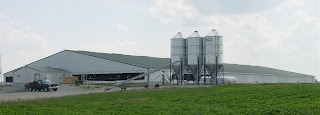How is it possible for these operations to have a small carbon footprint?
All concentrated animal feeding operations are required to have a nutrient management plan not to mention the vast array of permits and regulations. This nutrient management plan is created to follow specific state mandated requirements. It details amounts of waste produced daily and annually for each site and how that waste is to be utilized. The technological advances in farming provide several options, too. Waste can be used the traditional way, as fertilizer, it can be used to create energy from the methane gases, or the waste can go through a treatment system similar to any town or city’s waste water treatment facility.
As far as their carbon footprint, animal agriculture only contributes 2.8 percent of the U.S. Greenhouse Gas Emissions (GHG) and pork production is even less. Hog farms contribute a mere 0.33 percent. That is only one-third of one percent--people produce more GHG than that. New technology and a greater knowledge of environmental impact can be contributed to this small percentage. Such practices as recycling hog waste as fertilizer and using a smaller land area to raise more pigs is another contributor to making the pork industry a green industry.
The pork industry doesn’t just provide meat and fertilizer, though. There is so much more. An entire world of products come from pork. In fact, over 500 byproducts come from pigs. The plastic that my freezer is made of, the freezer that holds all those frozen hunks of pork, perhaps that came from a pig as well--plastics are pork byproducts. The chewing gum that has become my latest habit/addiction is a pork byproduct. Everything from glass to glue, from rubber to crayons, and if I wore make-up, I could thank a pig for that too. Antifreeze, linoleum, weed killer, insecticide, water filters, the list goes on and on. Yet, people want to rid our country of this vital product, this irreplaceable commodity and for what? For misguided morals, religion, or because someone else told them that’s what they want? Why?
Why would you not want the pork industry to keep up with the demand? Why would you not want pork, period? Pork is one of the healthiest meats next to fish. In fact, according to the Pork Checkoff and National Pork Board pork is even healthier than chicken in fat, calorie, and cholesterol content. With 40 percent of the world’s meat being pork and over 500
byproducts from these amazing animals the demand is astronomical. New technology that allows pork to be produced quickly, efficiently, and safely are necessary especially in these competitive times. That is were CAFOs come in and that is what CAFOs do. They create supply to meet the demand safely, efficiently, and economically while creating jobs and allowing family farmers to stay on the farm.
Finally, after contemplating the importance of animal agriculture and the pork industry then writing about it, I decide tonight is definitely a pork steak night. I reach through the icy fog until my fingers find the heavy thick package with “PORK STEAK” stamped on the top in bold black ink, slightly smudged. Up the stairs I tromp, still pondering our fortunate circumstances, reminded of a time in my life when I had to skip meals to make sure my kids had enough to eat. The time we had so little money that I went without, though I never starved, I did fight hunger pangs on a daily basis.
Unwrapping that pink and white marbled meat, I give thanks to the barn down the road that supplied us with this meat. A barn that houses nearly 5,000 pigs. A barn that helped the local community by the vast amounts of property taxes paid. A barn that stirred so much controversy that a town meeting was called just to settle down the community to little avail. A barn that housed the thousands of A barn that is called a CAFO.
Well, what did you think of my five part series, A Barn Called CAFO? As always, the comment box is open.


.jpg)


















.jpg)







